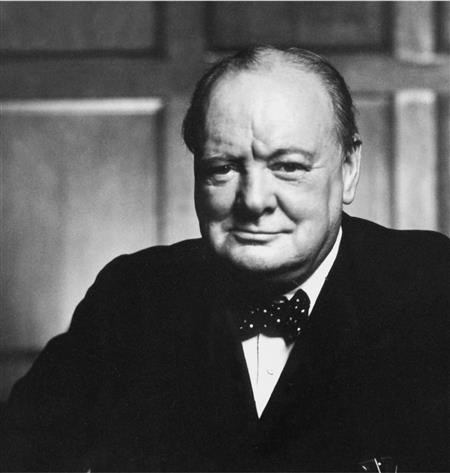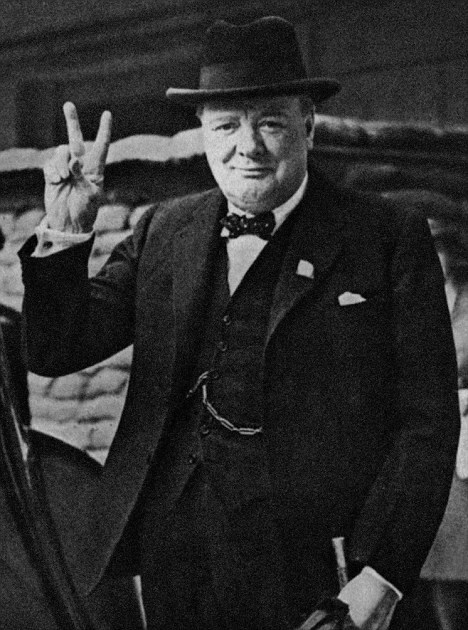 |
| Winston Churchill () |
Sir Winston Churchill was a British statesman who served twice as the Prime Minister of the United Kingdom from 1940 to 1945 and from 1951 to 1955. He was a national hero known for successfully leading Great Britain to victory against Nazi Germany in the Second World War. He was also a British army officer, a historian, a writer/author, and an artist. Born in Blenheim Palace, Woodstock, England on November 30, 1874, Churchill was the son of Lord Randolph Churchill, a family member of the Dukes of Marlborough, a branch of the Spencer family, and American New Yorker Jennie Jerome. During his childhood, he dealt with a speech impediment, but it did not deter him and he overcame it with practice. "After a dispassionate preparatory schooling, Churchill entered Harrow School which emphasized the classics. Having no aptitude for mathematics, Latin, or Greek, he loathed school. He later wrote that he was considered a dunce because he could only learn English, but that he did learn the 'essential structure of the ordinary English sentence--which is a noble thing,'" (Baughman et al, 1998). This led to his father's decision to enter him into the British military. Churchill passed the entrance exam on his third attempt.
Churchill enjoyed journalism and this proved valuable during his short military career and for many years to come. "While serving in the 1897 expedition against the Pathans in Northwest India, his accounts written for the London Daily Telegraph became the basis for his first book, The Story of the Malakand Field Force (1898)," (Baughman et al, 1998). During the next sixty-five years, Churchill wrote over forty written works, most of which were published while he served in Parliament. Many of the books were multi-volume and many of them were about famous British people or about the history of Great Britain. Some of his most famous works include The River War (two volumes, 1899), The World Crisis (five volumes, 1923-31), Marlborough: His Life and Times (four volumes, 1933-38), The Second World War (six volumes, 1948-54), and A History of the English-Speaking Peoples (four volumes, 1956-58). During his life, Churchill suffered from stress and depression. He adopted painting as a stress reliever and throughout his life, he painted over a hundred landscape paintings.
When the Second World War broke out in Europe on September 1,1939, Churchill, who had been a member of Parliament for nearly forty years, was appointed to First Lord of the Admiralty two days later. Things were not good for the Allies over the next several months as the Axis power continued to invade Europe one country at a time. On May 10, 1940, with France on the verge of falling to the Nazis and the British people without confidence in his leadership, Prime Minister Neville Chamberlain resigned. On his way out of office, Chamberlain asked King George VI to appoint Churchill to Prime Minister. "Thus, at the age of sixty-five--an age when most people are looking forward to retirement--the somber yet determined statesman embarked on what would prove to be the most challenging journey in his life and in the history of his nation," ("Winston Churchill." Contemporary Heroes and Heroines. Vol. 2. Detroit: Gale, 1992. Biography in Context. Web. 17 Feb. 2016). Upon entering office, Churchill immediately boosted the British morale with the successful evacuation of 350,000 allied troops from the beaches of Dunkirk in Nazi-occupied France. Knowing that Great Britain would be fighting Germany alone, Churchill addressed the nation with what might have been his most famous wartime speech. It included the words, "We shall fight in France, we shall fight on the seas and oceans, we shall fight with growing confidence and growing strength in the air, we shall defend our island, whatever the cost may be, we shall fight on the beaches, we shall fight on the landing grounds, we shall fight in the fields and in the streets, we shall fight in the hills; we shall never surrender," (Churchill,1940).
 |
| Winston Churchill 2 () |
When the German Luftwaffe began bombing London and other British cities, Churchill sent the Royal Air Force into the skies to take on the air menace. Losses were extensive to the RAF but the German losses were even worse and after four months of ferocious air combat, the Luftwaffe retreated. Despite being outnumbered and outgunned, Churchill and Great Britain managed to hold off the Nazis and win the Battle of Britain. Churchill had a strong relationship with United States President Franklin Roosevelt-between 1939 and 1945 they met eleven times and exchanged nearly 1,700 letters and telegrams. In the early 40's, he pushed Roosevelt for America's assistance in the war as the United States was still neutral at the time. Roosevelt responded by sending ships, airplanes, munitions, etc. to Britain's aid. In June of 1941, Germany attacked Soviet Russia and Churchill feared that if Russia fell, the United Kingdom would become the Nazi's next target for invasion. He stated, "If Hitler invaded Hell, I would at least make a favourable reference to the Devil in the House of Commons," (Churchill, 1941). Soon, British tanks and airplanes were being shipped over to the Russian Front to assist the "lesser evil" in the fight against the "greater evil". In December the United States finally entered the war after Japanese Attack on Pearl Harbor and at last Churchill did not have to worry about fighting the Axis power without help. After this, the war was uphill for the Allies and Churchill led Great Britain to victory on May 7, 1945 when Germany surrendered and ended the war in Europe.
Churchill was voted out of office in July of 1945. For the next six years he served as the Leader of the Opposition. In the general election of 1951, Churchill won the election and served as Prime Minister for another four years until he resigned in 1955. He continued to served as a member of Parliament until 1964 when he retired. On January 15, 1965, Churchill suffered a serious stroke and passed away nine days later in his London home at the age of ninety. He was honored with what was perhaps the largest state funeral in Britain's history. Sir Winston Churchill is a hero to me because with his strong will and leadership, he inspired his people in the fight for freedom and against tyranny. These character traits are what make him a good hero. Works Cited "Winston Churchill." Contemporary Heroes and Heroines. Vol. 2. Detroit: Gale, 1992. Biography in Context. Web. 26 Jan. 2016. "Winston Churchill." American Decades. Ed. Judith S. Baughman, et al. Detroit: Gale, 1998. Student Resources in Context. Web. 26 Jan. 2016.
Page created on 2/22/2016 12:00:00 AM
Last edited 2/22/2016 12:00:00 AM
